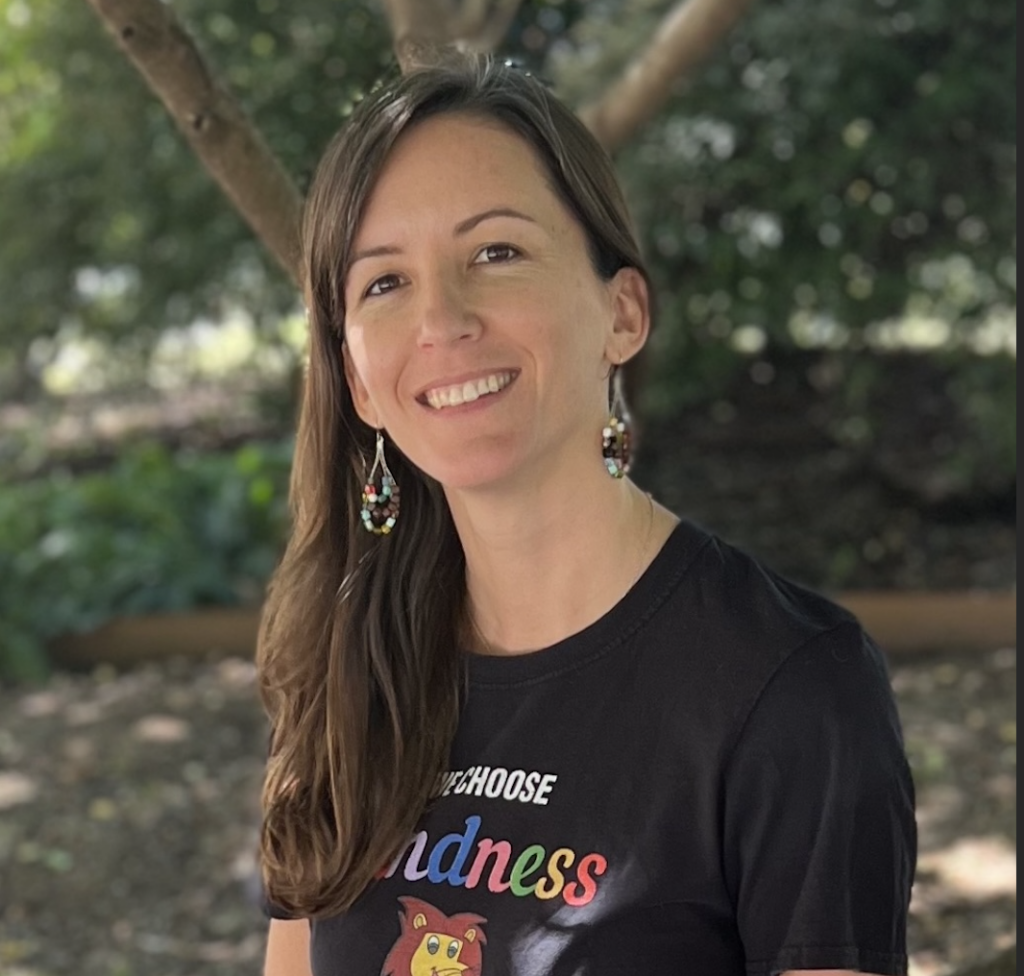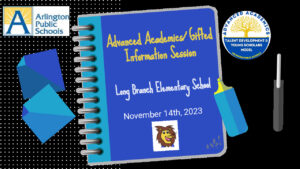Welcome to Advanced Academics at Long Branch Elementary! Please take a look through the helpful links below to discover more about what Long Branch has to offer our growing scholars. Celine Clark, the school’s Advanced Academics Coach (AAC), is thrilled to support teachers and students in higher-level thinking and learning. Feel free to contact Ms. Clark regarding specific questions about your child or services at Long Branch.
General Overview
 Arlington Public Schools is dedicated to maximizing the strengths and potential of all students so they may become self-confident, well-rounded, responsible and productive citizens. Many gifted and advanced students need opportunities to think abstractly, work at various rates and levels of complexity, and pursue tasks independently. In addition, students eligible for gifted services need opportunities to learn with others of like abilities, as well as opportunities to develop social relationships with others of all abilities. For more resources and information about gifted services and advanced academics in Arlington, please visit the APS Advanced Academics page.
Arlington Public Schools is dedicated to maximizing the strengths and potential of all students so they may become self-confident, well-rounded, responsible and productive citizens. Many gifted and advanced students need opportunities to think abstractly, work at various rates and levels of complexity, and pursue tasks independently. In addition, students eligible for gifted services need opportunities to learn with others of like abilities, as well as opportunities to develop social relationships with others of all abilities. For more resources and information about gifted services and advanced academics in Arlington, please visit the APS Advanced Academics page.
Delivery of Services
Gifted students need opportunities to think abstractly, work at various rates and levels of complexity, and pursue tasks independently. In addition, students eligible for gifted services need opportunities to learn with others of like abilities, as well as opportunities to develop socio-emotionally. APS Gifted Services are implemented through school-based and countywide activities, which comply with School Board and State objectives. These school-based services are delivered in the following ways:
- APS Gifted Services collaborative resource model, in which the classroom teacher works with the gifted resource coach to develop and present appropriately differentiated learning experiences for gifted students within the general education classroom.
- In the general education classroom setting, identified students are cluster-grouped (minimum of 5 – 8) and through a variety of flexible groupings based on ongoing data.
- Identified students work with teachers who are specifically trained in instructional needs of and curriculum written for gifted students.
- Specific curricula which are differentiated or extended from concepts in the general education curriculum, and when appropriate, through opportunities for acceleration and extension.
The Gifted Cluster Model
The Gifted Cluster model provides services to identified students by allowing the AAC to “push in” to the classroom and collaborate with teachers through CLTs and individual planning sessions. Using this model, gifted-identified students are placed in Gifted Cluster classrooms with intellectual peers. The classroom teacher, with the support of the AAC, is the primary provider for Gifted Services. Advantages of this model include…
- Students have intellectual peers necessary for academic and social development all day
- Students have more access to gifted curriculum and/or strategies in their classroom
- Non-identified students who also need challenges will have the opportunity to try out advanced curriculum or strategies
- AACs can monitor students that should be assessed for eligibility for gifted services
AAC Roles and Responsibilities
- Collaborate and co-plan with teachers
- Extend and deepen student learning through higher level discussion, rich content, and high expectations
- Provide supplemental resources
- Model lessons, co-instruct, or facilitate lessons
- Coaching best practices instructional strategies (i.e. APS’ K-12 Critical Thinking Strategies)
- Facilitate book clubs and extension projects
- Promote differentiation practices throughout the school
- Manage gifted and talented screening process and evaluation
- Facilitate professional development for teachers
For more information about Arlington Public Schools’ full plan for Gifted Services, please review: https://www.apsva.us/gifted-services/ . If you have any specific questions, or if you would like to learn more about differentiation, growth mindset practices, and gifted services at Long Branch, please do not hesitate to contact me.
Classroom Teacher’s Role and Responsibilities
- Collaborate with the AAC to provide differentiated curriculum, extension opportunities, and supplemental curriculum resources
- Plan units and lessons to meet the learning needs of students eligible for gifted services
- Coordinate instructional needs of all learners in the classroom
- Keep open communication with AAC on students that may need to be screened for gifted services
Identification Process
Each year, the total population of our school is screened by school staff to create a pool of eligible highly able candidates based on students’ participation and performance in various academic and arts activities.
- Screening is formal: We review all test scores following standardized testing, and scholastic academic performance.
- Screening is also informal: We note students’ competitions, awards, honors, and participation in school events.
Referrals for Gifted Services
Students may be referred for services by their classroom teacher, school personnel, parents/guardians, community leaders, and self or other students until April 1 for the current school year. A referral form must be filled out and given to the Resource Teacher for the Gifted.Referral Form also available in Spanish, Bengali, Amharic, Mongolian, and Arabic.Referrals may be submitted before April 1 annually. A referral form may be completed by the following sources:
- classroom teacher or other staff member
- parent/guardian
- community member
- student
Please note: any student who is in the automatic screening pool due to ability test scores, like the NNAT or CogAT, does not need a referral form. Students may be referred once during the academic school year. Typically this happens in the winter/spring unless student is new to APS. During this once a year referral process, a holistic case study approach is used to examine data from multiple areas of strength to determine eligibility in the following areas –
Areas of Gifted Services Identification
- Specific Academic Aptitude:
- English
- Mathematics
- Science
- Social Studies
- Visual or Performing Arts:
- Visual Arts
- Music
Eligibility Criteria
- Gifted Services in Specific Academic Areas
- Standardized Testing Information
- Teacher Checklist on Observations of Academic Behaviors
- Grades/Academic Performance
- Student Products
- Parent Information
Definition of a Gifted Student from the Virginia Plan:
- “These students possess talents and abilities that differ from those of their peers to such a degree that differentiated educational programs should be provided to nurture their growth and development.”
- “The identification of these students is based on the premise that they need and can benefit from specifically planned educational services different from those provided by the general educational experience.”
An Appeals Process is available to families following the eligibility process. Appeal begins at the school level with the principal. Second level of appeals is a county-wide Gifted Services Administrative Appeals Committee.
At-Home Enrichment and Challenge Opportunities
You may find your gifted learner needs more chances for enrichment and challenge. Be assured that I am continuously working with our Long Branch faculty to assist in developing differentiated materials and opportunities. In addition to faculty collaboration, I will continue to add resources as I find them, so please check back regularly. Email me with any questions you may have.
| Enrichment Resources | |
| Critical And Creative Thinking (CCT) – Choice Boards for Family activities | Learn about the CCT framework and find fun family activities to incorporate at home that build critical and creative thinking skills! |
| Khan Academy | Resources for students and parents to find challenges in various areas of math, science, and design thinking. |
| PBS Learning Media – Grades K – 2 | Interactive lesson plans, videos, and more across several disciplines. Also some cool current event videos and quizzes. |
| PBS Learning Media – Grades 3 – 5 | Interactive lesson plans, videos, and more across several disciplines. Also some cool current event videos and quizzes. |
| Smithsonian Learning Lab | Discover all the resources the Smithsonian has to offer as you dive deep into an interest area. Then create collections of the information you gather. Then you can share your collection or learn from others’ collections. |
| Mensa for Kids | Lesson plans, design activities, and TED connections will provide a lot of possibilities for extensions. |
| TED Talks to Watch with KidsTED Talks by Brilliant Kids and Teens | Feed your student’s curiosity. Watch with your student and inspire deep conversation, or have your student form an interest group among friends to watch and discuss specific TED Talks. |
| Wonderopolis | Each day a new “wonder” is posted. This is a great chance for the curious learner to look into several different fun facts and have follow up resources to learn more. |
| CrashCourse | YouTube channel that has a huge library of videos on a variety of topics and disciplines. |
| GeographyNow | YouTube channel that has a collection of informational and fun videos about different countries around the world. |
| Renzulli Learning | When it comes to gifted education, Joseph Renzulli is kind of a big deal! Renzulli Learning is an online interactive system that helps students develop a learning profile and then have access to helpful resources and ideas based on the individualized learning profile. You can check out the home edition of Renzulli Learning to find engaging activities for the whole family. |
| Virtual Field Trip Ideas and Links | Bummed that you can’t travel right now? Try these virtual field trips and visit the Louvre without waiting in line! Try them out and tell me which trips are your favorite. I personally am loving some of the interactive zoo experiences. |
| The Gifted Guy Enrichment | Check out fun videos that teach a student how to learn chess, or how to do sodoku, or how to create your own School House Rock, etc. There are a lot of fun chances to learn how to do something that stimulates your brain. |
| Google Arts & Culture | Zoom in on famous pieces of art to learn more about the work and the artist. You can also participate in fun quizzes. |
| PBS Think Math | Take on some real world applications of mathematics and think more deeply about how to apply that math skill you wondered “When will I use this in real life?” |
| NCES Kids’ Zone | A Fun place to try out some statistics games, look at different schools, and even learn about different colleges with the college navigator. |
| You Can Do the Rubik’s Cube | Always wanted to impress your friends with your Rubik’s Cube skills, but never could quite figure it out? Check out this site and learn how to be a cube master! |
| KenKen Puzzles! | Test out your math skills, stretch your brain, and have fun! Here are KenKen puzzles for all grades. |
| Brilliant | Try out a daily challenge! |
| NASA Stem Engagement | Want to check out some STEM activities? NASA has you covered! Become the next generation of explorers with NASA Education Outreach. |
| Try Engineering | Explore different fields of engineering and activities that will challenge you with problem solving. |
| Smithsonian’s History Explorer | An excellent place to learn more about a time, event, person, or group from history that you have been curious about. |
| Ken Burns In the Classroom | One of the masters of documentaries! You can explore a time period in history through his documentaries and analysis of primary sources. |
| Extra History | Interested in military history? Here is the YouTube channel for you! |
| National Geographic Kids | National Geographic Kids is a great resource with activities, videos, and games on a variety of topics. |
Book Recommendations
Below are some books that may be helpful in navigating the many facets of guiding/supporting gifted learners. If you have any book recommendations that aren’t listed but you think could interest other parents, please email me!
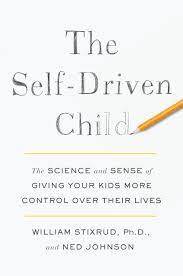 |
The Self-Driven Child: The Science and Sense of Giving Your Kids More Control Over Their Lives by William Stixrud, Ph.D. and Ned Johnson
Gifted learners, and most adolescents, crave independence. This book does an excellent job of exploring the need for independence and how to help parents navigate the challenging task of encouraging responsibility and intrinsic motivation within their children. |
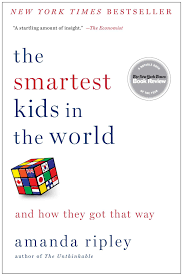 |
The Smartest Kids in the World and How They Got That Way by Amanda Ripley
This book explores the education system through a statistical lens, as well as a student/teacher/parent experience lens. Through the eyes of three American students participating in exchange programs and first-hand professional accounts of challenges and successes, Ripley is able to juxtapose the approach to education in the United States, Finland, Poland, and South Korea. I particularly found the “How to spot a world-class education” section of Author’s Note helpful with guiding questions for teachers, parents, and students. |
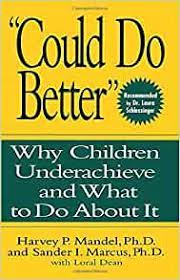 |
“Could Do Better” Why Children Underachieve and What To Do About It by Harvey P. Mandel, Ph.D. and Sander I. Marcus, Ph.D.
Underachievement can be so frustrating for students and parents, as well as how to inspire change moving forward. This book was published in the mid 90s, but I still find its content to be relative as we analyze the explanations for underachievement. Mandel and Marcus look at different types of underachievers and give practical tips in how to move forward and inspire a change in performance. |
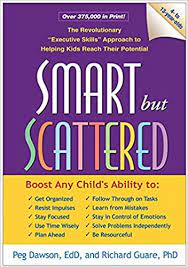 |
Smart by Scattered by Peg Dawson, Ed.D. and Richard Guare, Ph.D.
It can be extremely frustrating for a gifted student to have the mental capacity to take on big challenges but possibly not the advanced executive functioning skills needed to complete the task. This book guides parents and students through practical tips to help develop the executive skills necessary to achieve in school and later in life. |
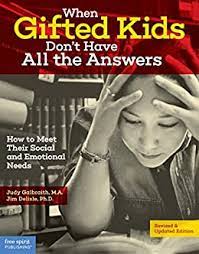 |
When Gifted Kids Don’t Have All the Answers: How to Meet Their Social and Emotional Needs by Judy Galbraith, M.A. and Jim Delisle, Ph.D.
Gifted kids are intelligent, curious, creative thinkers, problem solves, and critical observers. It can often seem like an advanced learner will “be just fine,” but this is one of the greatest myths that gifted education specialists try to break down. Gifted learners often experience asynchronous development where their mental awareness may not always match their social and emotional maturity; this can lead to anxiety, depression, and/or frustration. This book does a good job of exploring and explaining the unique social and emotional needs of gifted learners. |
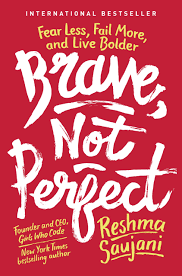 |
Brave, Not Perfect by Reshma Saujani
This book is written by the founder and CEO of Girls Who Code. If you are raising a gifted girl, this book does an excellent job of explaining society’s often unfair depiction of gifted girls and how to interrupt that narrative. The book discusses breaking the habits of perfectionism and teaching gifted girls to be brave and approaching challenges with a growth mindset. |
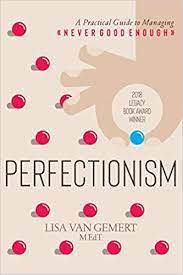 |
Perfectionism by Lisa VanGemert, M.Ed.T.
Many gifted students suffer from perfectionism and are often afraid of failing or not ever being good enough. This book explores the many different facets of perfectionism and how it can manifest in anxiety or underachievement. The following chapters then give practical approaches to battle perfectionism with a variety of strategies. |
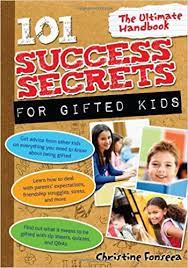 |
101 Success Secrets For Gifted Kids by Christine Fonseca
This is a wonderful book for any older elementary student to read. Each chapter looks into a specific subject about giftedness and what that means for an adolescent. It shares relatable stories, practical tips, and simple suggestions that will help your gifted kid develop self confidence and resilience. |
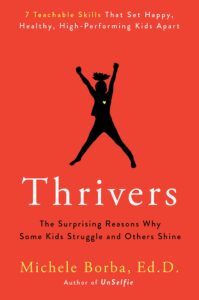 |
Thrivers: The Surprising Reasons Why Some Kids Struggle and Others Shine
The high-achieving students are more stressed, unhappier, and struggling with anxiety, depression, and burnout at younger and younger ages. Thrivers are different: They flourish in our fast-paced, digital-driven, often uncertain world. Why? The difference between those who struggle and those who succeed comes down not to grades or test scores, but to seven character traits that set Thrivers apart (and set them up for happiness and greater accomplishment later in life). |
Resources
- Supporting Gifted Children at home
- Parenting Gifted Children suggested guidelines for parents
- NAGC Parent Tip Sheet
Virginia Department of Education Web Site
This web site contains FAQs about Gifted Education, links to the state regulations and state and national organizations related to Gifted Education. Other documents available on this page include: Understanding the Regulations Governing Educational Services for Gifted Students and the Reference Guide for the Development and Review of the Local Plan for the Education of the Gifted and Supporting the Identification and Achievement of Twice-Exceptional Students.
Virginia Association for the Gifted
VA Gifted advocates for gifted children and services at the state level, publishes a quarterly newsletter, and holds bi-annual conferences.
Virginia Gifted Education and Governor’s Schools
Offers a variety of information from the Virginia Department of Education website. The Commonwealth of Virginia provides services to identified students, kindergarten through grade 12.
National Association for Gifted Children (NAGC)
NAGC is a non-profit organization of parents, teachers, educators, other professionals, and community members who unite to address the unique needs of gifted children and youth. NAGC publishes a quarterly journal, a parenting magazine, and holds an annual conference.
Supporting Emotional Needs of the Gifted (SENG)
SENG is dedicated to fostering environments in which gifted adults and children understand and accept themselves and brings attention to the unique emotional needs of gifted children.
Council for Exceptional Children (CEC)
CEC is the largest international professional organization dedicated to improving educational outcomes for individuals with exceptionalities. CEC includes a TAG (Talented and Gifted) division.
Formed in 1999, the Davidson Institute is a 501(c)3 private operating foundation funded by Bob and Jan Davidson to recognize, nurture and support profoundly gifted students and to provide opportunities for them to develop their talents. A variety of free brochures that can guide parents in the support of their children. The Foundation also provides a variety of scholarship opportunities.
Hoagies’ Gifted Education Page
This Web site is an “all-things-gifted” resource for parents, educators, and gifted teens.
 Contact
Contact  Calendars
Calendars Careers
Careers Engage
Engage  District
District


